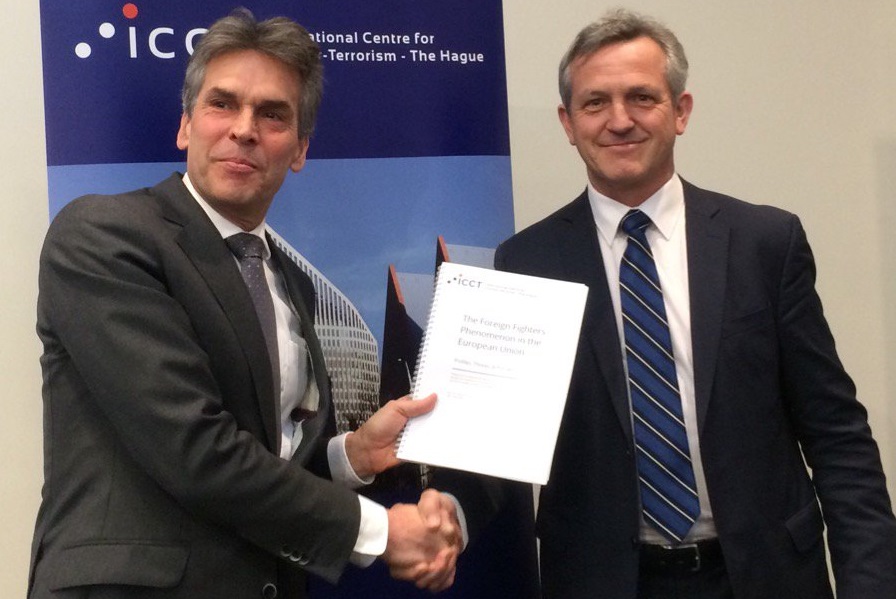On 1 April 2016, ICCT launched its Report 'The Foreign Fighters Phenomenon in the European Union: Profiles, Threats & Policies' in the presence of (inter)national policymakers, counter-terrorism experts, ambassadors, academics and media representatives. The event took place at the international press centre Nieuwspoort in The Hague, where the first copy was handed to the Netherlands National Coordinator for Security and Counter-Terrorism (NCTV) by ICCT Director Mark Singleton. It was NCTV’s Dick Schoof who thanked the ICCT for a thorough report on this interesting and important subject. Due to its unique methodology, the Report has filled a knowledge gap on the analysed topic by outlining different profiles.
The main findings of the Report were presented by some of the authors, Eva Entenmann, Dr. Alastair Reed, Dr. Grégory Chauzal, Dr. Christophe Paulussen & Dr. Bibi van Ginkel. Their findings as to numbers, profiles, threat levels and policy recommendations were summarised and include for instance:
- Of a total estimated 3,922 – 4,294 foreign fighters from EU Member States, around 30% have returned to their home countries.
- A majority of around 2,838 foreign fighters come from just four countries: Belgium, France, Germany, and the United Kingdom, with Belgium having the highest per-capita FF contingent.
- There is no clear-cut profile of a European foreign fighter. Data indicates that a majority originate from metropolitan areas, with many coming from the same neighbourhoods, that an average of 17% are female, and that the percentage of converts among foreign fighters ranges from 6% to 23%.
- The radicalisation process of foreign fighters is reported to be short and often involves circles of friends radicalising as a group and deciding to leave jointly for Syria and Iraq.
- While many Member States have already bolstered security and legislative policy measures, a larger focus needs to be put on preventive measures as well as rehabilitation and reintegration programmes to deal with returning foreign fighters.
Following the short presentation of the report, Ioana Van Nieuwkerk (Legal Officer, Eurojust) and Brian Donald (Chief of Staff, Europol) reflected on the main findings. Ms. Van Nieuwkerk conveyed Eurojust’s appreciation for the initiative to conduct research on such a complex and dynamic phenomenon. She acknowledged the existing global risk of (returned) foreign fighters and spoke of the role and work of Eurojust in counteracting this phenomenon. Ms. Van Nieuwkerk also emphasised the importance and need for continuous analysis of legislative developments and stated that there is, in line with the Report’s findings, a challenge in monitoring programmes on radicalisation.
Mr. Donald stated that Europol was overall impressed with the outcome of the research. In addition, he addressed the importance of data collection, exchange and analysis at EU level. He noted that Europol had collected slightly larger numbers of foreign fighters, their estimate being 5000, but confirmed that also they had found an increased number of women who left for Syria and Iraq, but who return in lower numbers.
Finally, the Q&A session provided the opportunity to the attending audience to respond to the prior discussions and share their perspective on the current issue.
Please find here the Full Report and Executive Summary.
Coverage in Selected Media Outlets:
International Media:
La Repubblica, Ecco chi sono i jihadisti d'Europa, 11 April 2016
The Economist, Profiling Europe's jihadists, 8 April 2016
The Charlotte Observer, European anti-terror efforts hobbled by lack of trust, shared intelligence, 4 April 2016
The Jerusalem Post, France, Belgium largest exporters of foreign fighters to Iraq and Syria, study finds, 4 April 2016
Al Jazeera, One-third of EU fighters in Syria returned home: Study, 2 April 2016
The Gulf Today, France largest source of 'EU fighters in Syria', 2 April 2016
Reuters, Belgium largest source of European fighters in Syria per head: study, 1 April 2016
Die Welt, Ein Drittel der IS-Kämpfer ist zurück in Europa (German), 1 April 2016
Politico, Belgium has most foreign fighters per head, 1 April 2016
The Copenhagen Post, Many foreign fighters returning home to Denmark, 5 April 2016
De Morgen, 30 procent Syriëstrijders teruggekeerd naar Europa (Dutch), 1 April 2016
Deutsche Welle, Report: Most EU foreign fighters come from four countries, 1 April 2016
El Periódico, Más de 4.000 europeos se han unido a los grupos yihadista en Siria e Irak (Spanish), 1 April 2016
RT, Most European ISIS fighters come from France, Germany, UK - study, 1 April 2016
L'Express, 30% des Européens partis combatrre en Syrie seriaent de retour dans l'EU (French), 3 April 2016
Bloomberg, Counter-Terrorism Center Says About 1,200 Foreign Fighters in EU, 1 April 2016
Press TV, Most of EU militants in Iraq, Syria from 4 states: Study, 1 April 2016
Sputnik International, Welcome Home! A Third of Europe's Jihadist Fighters Return From Syria, Iraq, 1 April 2016
Business Insider, Study: Belgium is the largest contributor of foreign fighters to Syria in proportion to its population, 1 April 2016
Ynet News, Belgium largest source of European fighters in Syria per capita, 1 April 2016
Al Arabiya, Most EU foreign fighters in Iraq, Syria are from 4 nations, 2 April 2016
Ghana Web, One-third of EU fighters in Syria returned home - Study, 2 April 2016
Dutch Media:
Trouw, Syriëganger steeds jonger en minder religieus (Dutch), 1 April 2016
Het Nieuwsblad, Nieuwe jihadist radicaliseert op dertig dagen (Dutch), 2 April 2016
De Standaard, Jihadist radicaliseert al in 30 dagen (Dutch), 2 April 2016
De Telegraaf, IS-strijders in woonwijken geronseld (Dutch), 1 April 2016
Algemeen Dagblad, Nieuwe jihadi's razendsnel geradicaliseerd en piepjong (Dutch), 1 April 2016
NRC, 30 procent van Europese Syriëgangers teruggekeerd (Dutch), 1 April 2016
Elsevier, 'Eenderde Syriëgangers keert terug naar Europa' (Dutch), 1 April 2016
NOS, Nederland doet het goed bij aanpak radicalisering (Dutch), 1 April 2016





